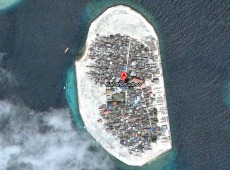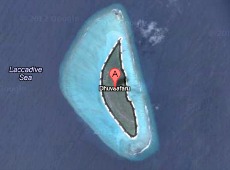Former President Mohamed Nasheed announced the Maldivian Democratic Party’s (MDP) willingness to discuss enacting an interim government with the Progressive Party of Maldives (PPM), which the party believes is essential for free and fair elections to occur.
The MDP has desired the establishment of an interim government since the controversial transfer of power of February 7, 2012 and is open to holding discussions with the PPM to establish a transitional government prior to September’s Presidential elections, Nasheed stated during a press conference held at the Mookai Hotel in Male’ today (May 16).
“If PPM wants to bring in an interim government, we are ready to hold discussions. MDP wants an interim government. We at MDP have always wanted an interim government. But we need support from other parties to do that in parliament. If PPM is so inclined, we are ready to hold discussions with PPM to achieve this,” Nasheed said.
“For free and fair elections [to take place], we are encouraged that PPM has pledged to stop Waheed from campaigning on state funds,” he added.
The MDP is continuing its call for the Commission of National Inquiry (CoNI) recommendations to be implemented, with the supervision of the international community. Nasheed stated he was disappointed CoNI recommendations have yet to be enacted – especially regarding holding to account those who mutinied against the government and committed various brutal acts, including destroying the MDP’s headquarters.
Nasheed said that the MDP did not believe free and fair elections were possible with Police Commissioner Abdulla Riyaz and Defence Minister Colonel (Rtd) Mohamed Nazim in their current positions, and has asked they be “transferred” from their current posts.
He distinguished between ‘rank and file’ Police Service and Maldives National Defence Force (MDNF) and their leadership. Nasheed said action should be taken against the highest ranking officers for their role on February 7.
MDP Spokesperson Mohamed Zuhair told Minivan News today that local media reports of Nasheed calling for Riyaz and Nazim to be “forcibly removed” are inaccurate, however the former President has called for their removal and transfer “as far away from their current positions as possible”.
“They are already enacting measures of intimidation under the guise of ‘coordination’ by requesting political parties give the name of a person to work with the police. The Elections Commission should be enacting such a policy, not the police. It’s very strange and highly suspicious,” said Zuhair.
Should PPM be of the same view that an interim government is necessary for credible elections to be held, MDP would work through the parliament to discuss with PPM, Zuhair explained.
“PPM’s President and former President Maumoon Abdul Gayoom has said their party would ‘go it alone’ and not form a coalition, because that would not allow policies to be implemented effectively. Then the natural next step [for the PPM] would be to gain parliamentary support from the only player able to give support, MDP,” said Zuhair.
PPM Spokesperson and MP Ahmed Nihan today rejected the likelihood of the government-aligned party working with the opposition MDP to remove President Waheed from office ahead of elections in September.
“I do not believe this is a possibility. If it was possible, we would have done this already I believe,” he said.
Nihan claimed that the PPM’s main concern at present was for free and fair elections to take place. However, he added that with the Commonwealth-backed CoNI concluding that President Waheed’s coalition government – which includes the PPM – had come to power legitimately, it would not back the MDP’s calls for the present administration to be removed.
Nihan added that, while continuing to support the present coalition government, many PPM supporters believed that the party presently represented one of only two political ideologies in the country. These philosophies he said were those of PPM founder former President Maumoon Abdul Gayoom, and former President Nasheed and the MDP.
Nihan claimed that the majority of the country’s smaller parties, including those choosing to side with President Waheed in a pre-election coalition, were all rooted to former President Gayoom and his “political wisdom”.
“Strange bedfellows”
Nasheed also addressed the recent addition of the Dhivehi Rayyithunge Party (DRP) to the President Mohamed Hassan Manik’s coalition – which includes his Gaumee Ittihad Party (GIP) and the Adhaalath Party (AP) – and it’s incompatibility with a democratic presidential system of governance.
Nasheed expressed his happiness about Gayoom’s statement that coalitions do not work because they are not in line with a presidential governing system and are instead more reflective of a parliamentary system.
“I am very happy that President Gayoom – [who is] no doubt is the most experienced political leader [in the nation] – has been very clear about how inefficient for democratic policies the formation of coalitions are in a presidential system,” said Nasheed.
Nasheed noted that the Adhaalath Party and Sheiks’ extremist views will pose difficulties for the GIP-led coalition. Although the DRP are billing themselves as a moderate party, they will not establish the national ‘bastion of tolerance’ they claim to be purporting, Nasheed said.
The former President believes the coalition is a “hodgepodge” mix of ideologies, not politics and these “strange bedfellows” cannot achieve anything.
DRP disintegration
Nasheed stated that the alliance between GIP and DRP is only agreement between the two individual and not reflective of grassroots DRP supporters. He believes that DRP leader Thasmeen Ali and Waheed had no other choice and formed the coalition out of sheer necessity.
He also stated that the recent coalition has not produced a “third ideology” and that only two ideologies exist in the Maldives.
During door to door campaigning, the MDP has noticed that DRP grassroots support is disintegrating. They are either merging with PPM or joining MDP, according to MDP Press Director Mohamed Zuhair.
Additionally, Zuhair discussed the distinction President Nasheed made between other parties and MDP. He highlighted that MDP policies are formulated by consulting every household to asses the Maldivian people’s needs. This is followed by holding consultative seminars, with the feedback passed to the party’s ‘organs’ for discussion, then to policy committees, with the process culminating in an announcement.
“None of the other parties have this method,” said Zuhair.
“So far three policies have been announced, and the fourth – agrobusiness – will be announced tomorrow,” he continued.
“MDP is focusing on policy issues, having to ‘go out on the road’ and stage protests to ensure free and fair elections will change the entire dynamics of the campaign. We are hoping it doesn’t come to that,” said Zuhair.

